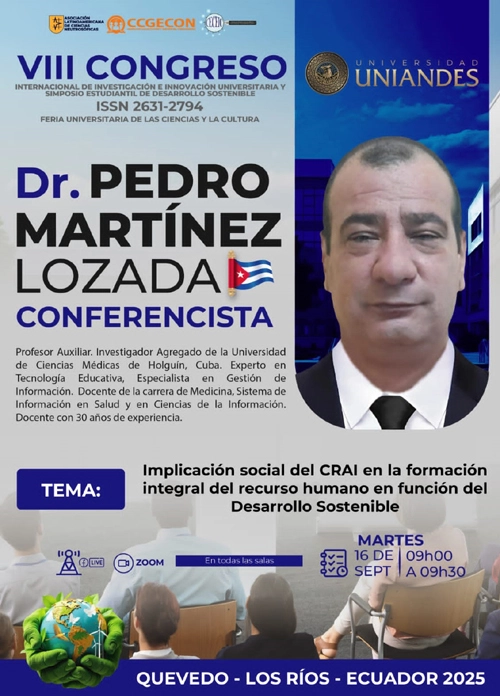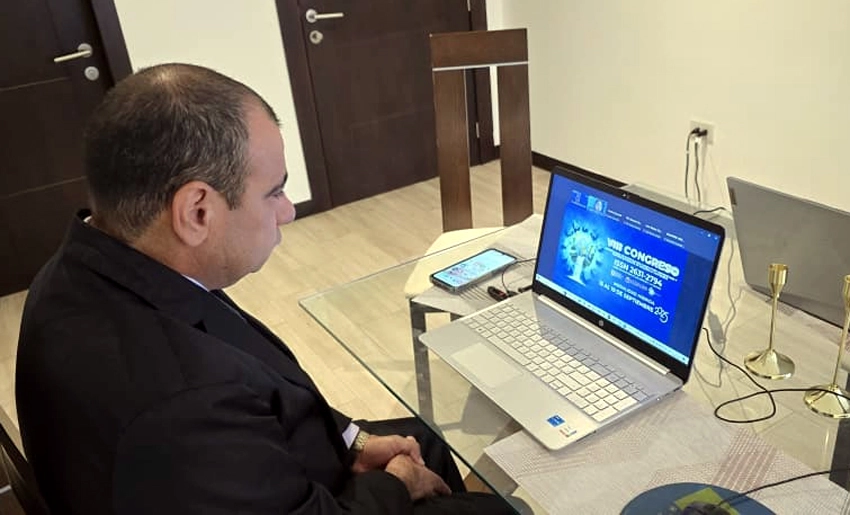Master of Science Pedro Rafael Martínez Lozada is the only delegate from the province of Holguin, and one of four professionals from Cuba. Attending the 8th International Congress on University Research and Innovation and Student Symposium on Sustainable Development. A major event taking place from September 15th to 19th in a hybrid format, held in the city of Quevedo, Los Ríos province, Ecuador.
The Holguin scientist is part of the staff of the Provincial Center for Medical Sciences Information. Recently converted into the First Resource Center for Learning and Research in Health in Cuba. And is participating as a keynote speaker, on the topic of Social Involvement of the CRAI in the Comprehensive Training of Human Resources for Sustainable Development.
Regarding the main issues of this event, Jean Pierre Ramos Carpio, Academic and Administrative Coordinator of the Latin American Association of Neutrosophic Sciences. Also a member of the organizing committee, explained that this congress has reached a record number of approved presentations from Colombia, Mexico, the United States, Cuba, Venezuela, and Ecuador.
Moreover he added that young researchers are also participating in the Student Symposium, which will present 73 presentations. It is being held in a hybrid format with nine virtual and five in-person rooms at the Quevedo Regional Autonomous University of Los Andes. This allows for the academic integration of researchers from diverse countries and their contexts.

The thematic axes of the Congress cover areas for the development of our society: health and well-being, ethics and justice. Higher education and academic quality, science and technology for development. Sustainable economic and business development, and environmental sustainability.
Among its main objectives, the event pursues the promotion of an environment of academic and cultural exchange that broadens the perspectives of researchers, faculty, and students. To foster international scientific exchange and promote debate on research as a means to solve social problems. It also features five core thematic areas and nearly 800 presentations by students, researchers, and professors from seven countries.
The ALCN is a non-governmental academic and scientific organization based in Ecuador that seeks to foster and promote the science of these neutrosophic theories. Seeking to develop the potential of university students, professors, and scientists throughout Latin America.
Hence, according to the Master of Science, the Latin American Association of Neutrosophic Sciences (ALCN) is promoting this initiative to promote neutrosophic philosophy. A school of thought that recognizes that an idea is not only true or false. But can have multiple values of truth, falsity, or determination, depending on the context. This vision allows us to address the complexity of the contemporary world with a flexible, critical, and creative approach.
“From the Latin American Association of Neutrosophic Sciences, we reiterate our commitment to science, innovation, and the training of new generations of researchers. We invite the entire Latin American and international academic community to continue joining this great collective effort. For a science at the service of human development,” he concluded.
Almost five years ago, it began collaborating with various institutions and universities in Cuba, signing agreements. These centers include the Universities of Havana, Cienfuegos, and Holguin. The National Center for Medical Information Sciences, and the higher education institutions of the Medical Sciences of Pinar del Rio, Guantanamo, and Holguin.
- The 4th edition of the Master’s Program in Natural Medicine will begin in Holguin - 16 de January de 2026
- Blood Bank Inaugurated at Holguin Military Hospital - 15 de January de 2026
- Holguin Cancer Center Plans to Incorporate Endoscopic Surgery in Urology - 14 de January de 2026

